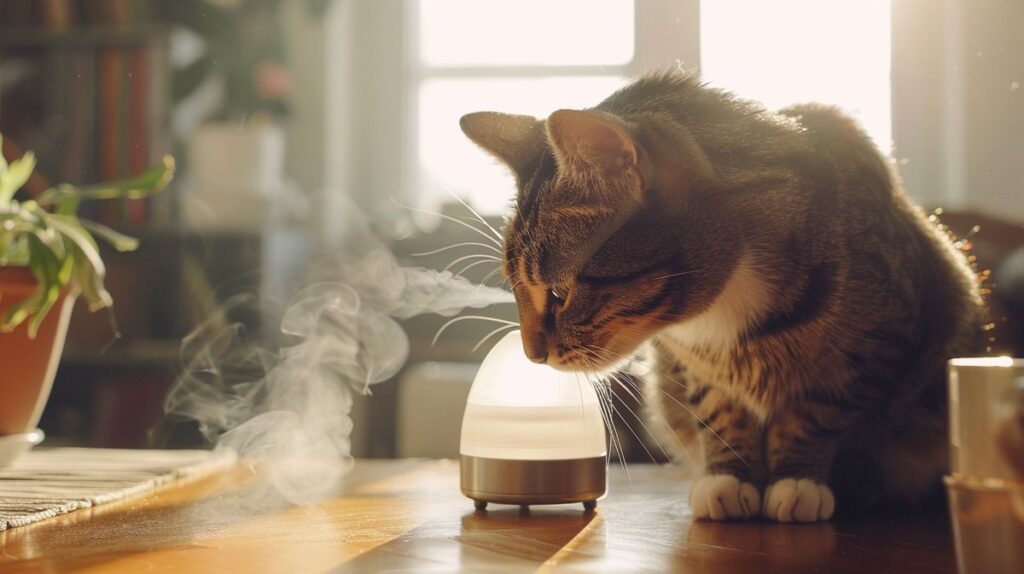Is Air Wick Safe for Cats? Comprehensive Insights and Safety Tips
Did you know you could be subjecting your cat to a fragrant minefield every time you use Air Wick freshener, unbeknownst to you? Well, buckle up buttercup, because we’re about to delve into this aromatic conundrum together!
Much like we scrutinize the ingredient list of a suspiciously delicious snack, it’s crucial to comprehend what goes into products like Air Wick. So, dear reader, let’s dive headfirst into the enchanting yet potentially perilous world of air fresheners, to sniff out the truth once and for all.
This whisker-twitching adventure promises nuggets of critical knowledge on feline susceptibility to the chemicals and essential oils in Air Wick, sprinkled with handy do’s and don’ts for a harm-free, pleasantly-fragrant home.
Understanding Air Wick Products
Ever wondered about the magic behind the myriad fragrances of Air Wick? Let’s dive into the delightful world of their products and uncover their aromatic secrets.
What are Air Wick Products?
– Air Wick products are crafted to elevate your indoor spaces, transforming your home into a fragrant haven. They come in a variety of enchanting forms:
- Sprays: These are your go-to for a burst of aroma when you need instant odor control. Quick, convenient, and oh-so-refreshing!
- Plug-in Diffusers: These handy devices release a continuous stream of fragrance, ensuring your space smells delightful all day long.
- Candles: Combining soft, flickering light with enticing scents, these are perfect for creating a cozy, relaxing atmosphere.
- Automatic Air Fresheners: These little wonders spray at regular intervals, keeping your air quality consistently pleasant with minimal effort on your part.
Common Ingredients in Air Wick Products
– Delving into the ingredients of Air Wick products reveals a blend of nature and science that delivers their signature scents:
- Essential Oils: Natural extracts packed with aromatic goodness. However, their impact can vary based on the type of oil used.
- Volatile Organic Compounds (VOCs): These chemicals can vaporize at room temperature, potentially contributing to indoor air pollution. It’s crucial to note their implications for pet health.
- Phenols: Though effective for their disinfectant properties, phenols can pose significant health risks to cats, making it necessary to be cautious.
- Other Chemicals: This category encompasses a variety of substances that enhance fragrance and durability. While they add to the product’s appeal, their safety concerning pets is a point of consideration.
When it comes to the burning question “is Air Wick safe for cats,” it’s essential to weigh the potential risks these ingredients pose to our furry companions. Each component must be scrutinized to ensure our whiskered friends remain healthy and happy.
How Cats’ Sensitivity Affects Their Safety
In this section, we’ll dive into the whimsical world of feline senses and the hidden dangers lurking in everyday air fresheners like Air Wick. By exploring the hypersensitive noses of our furry friends, the risks of volatile compounds, and the perilous potential of essential oils, we’ll uncover why it’s crucial to question: is Air Wick safe for cats? Let’s embark on this enlightening adventure!
The Sensitive Sense of Smell in Cats
Imagine having a superpower that lets you sniff out every little thing! Cats, with their astonishing 45 to 200 million odor-sensitive cells, live in a world rich with scents—far more vibrant than our humble five million cells could ever detect. While this olfactory acuteness is their feline forte, it also spells trouble when encountering chemicals nestled within air fresheners like Air Wick. Now, when pondering the notion, is Air Wick safe for cats, this superpower makes it pretty clear: caution is a must!
Risks Posed by Volatile Organic Compounds (VOCs)
Here’s where things get seriously spooky.
Volatile Organic Compounds (VOCs) are sneaky little chemicals that can quickly morph into vapors, invading your cozy home environment, and understanding their impact on indoor air quality is crucial. You can learn more about VOCs and their health effects on the EPA’s website. These vaporous villains can mess with natural elements in the air, making it less than fresh! While humans might experience a range of health issues from VOCs, our petite, whiskered pals are even more at risk. Given their smaller stature and super-sniffy senses, VOCs pose a bigger danger to cats, emphasizing why the question is Air Wick safe for cats is a pet parent’s priority.
Essential Oils and Their Impact on Cats
Now, let’s talk about essential oils—the aromatic darlings of the air freshening world. While they might sound delightful, they’re deceptively dangerous, especially for cats. Air Wick products often contain these fragrant oils, which are a serious health hazard if inhaled or ingested by our furry friends. Phenols, a pesky player in many essential oils, can wreak havoc on a cat’s liver, leading to severe conditions. So, if you’re contemplating is Air Wick safe for cats, it’s vital to recognize that while these scents may enchant your nose, they put your feline friends at grave risk.
Is Air Wick Safe for Cats? Delving into Health Risks
Common Symptoms of Exposure
Oh, the delightful world of air fresheners! But have you ever stopped to ponder whether Air Wick is safe for cats? These charming felines are uniquely sensitive, especially to the chemicals lurking in some air fresheners. Here’s a whimsical yet crucial dive into the symptoms our cute companions may exhibit:
- Drooling: Imagine Fluffy turning into a mini-Niagara Falls. Sudden excessive drooling could be their first, drippy cry for help.
- Vomiting: Those pesky chemicals can upset your kitty’s stomach, turning them into a puke machine. Gastrointestinal distress often surfaces as vomiting.
- Tremors: Picture this: Shaky paws and twitching tails. Ingesting or inhaling harmful substances might cause these unsettling tremors.
- Difficulty Breathing: A wheezing kitty is an unhappy kitty. Look out for labored or rapid breaths as this could be a sign of respiratory issues.
- Loss of Appetite: If your cat’s ignoring their favorite tuna treat, it might be more than just a fleeting whim. Chemical exposure can dampen their appetite, leading to weight loss.
- Potential Liver Damage: Essential oils and phenols, oh my! These toxic ingredients can quietly damage your cat’s liver over time.
Potential Long-term Health Issues
Let’s face it, prolonged exposure to Air Wick products can spell trouble for our feline friends. Here’s a sneak peek into the long-term health concerns:
- Feline Asthma: Chronic exposure can irritate their tiny respiratory systems, evolving eventually into feline asthma. Cue the coughing, wheezing, and those heart-wrenching struggles to breathe. Long-term meds may enter the scene.
- Neurological Problems: The toxins may as well be mixing up their brainwave patterns. Watch out for seizures, disorientation, and other bewildering behaviors.
- Hormone Disruption: Ah, those sneaky chemicals like phthalates! They can throw off your cat’s hormonal balance, impacting their reproductive and endocrine systems.
- Severe Respiratory Issues: Beyond asthma, chronic respiratory conditions can develop, making every breath a heavy lift for your kitty.
-
Cancer: Long-term chemical exposure also nudges up their cancer risk, particularly affecting the respiratory system and liver.
In this video, discover the hidden dangers of common air fresheners like Air Wick for your furry friends. Learn about the harmful chemicals they contain and how they can affect your cat's health.
To keep your feline companions purring happily, ponder whether Air Wick—in all its chemically glory—is a friend or foe. Opt for natural or cat-specific air fresheners and sprinkle a bit of peace of mind into your household!
Guidelines for Using Air Wick Products Around Cats
Feline aficionados, rejoice! Let’s dive into how you can use Air Wick products without compromising the safety of your whiskered friends.
Proper Ventilation and Limited Use
When pondering, “is Air Wick safe for cats?”, proper ventilation is your best friend. Make sure to use Air Wick products in well-aerated spaces, like rooms with windows or fans. This helps to dissipate any potentially harmful chemicals, reducing the risk to your feline companions.
Limiting how often and how much you use these products is crucial too. An air freshener overdose can saturate the air with volatile organic compounds (VOCs) and other nasties, posing serious health risks to your cats. By using these products sparingly, you’ll create a safer, fresher environment for your furry pals.
Keeping Products Out of Cats’ Reach
If your cat were to write a ‘how to’ guide on staying safe around Air Wick, the top tip would be: keep these products out of reach! Stash all your Air Wick goodies in cabinets or areas completely inaccessible to your cats. This prevents any accidental ingestion or inhalation of concentrated chemicals. Trust me, your furball will thank you.
Avoid applying Air Wick products directly onto surfaces your cats frequent like their bedding, litter boxes, or play areas. Cats are curious creatures and these surfaces can hold onto chemicals, heightening exposure risks. Instead, target areas your feline friends don’t inhabit as often. That way, you’re crafting a safer spot for them to lounge and play.
Safer Application Methods
If you’re still asking, “is Air Wick safe for cats?”, it’s time to explore alternatives. Consider using natural or cat-specific air fresheners that are formulated with pet safety in mind. These alternatives are usually much kinder to your furry friends’ health.
And here’s a golden rule: always make sure your product use aligns with vet recommendations. Scour those ingredient labels and understand what’s in each product. For tailored advice on keeping your indoor air quality top-notch without harming your pet, your vet is your go-to guru. Absorbing tips from pet care experts can provide you with safer, more effective air care solutions.
Natural and Cat-Specific Alternatives to Air Wick
Let’s embark on a whimsical journey to discover safer, natural, and cat-approved alternatives to Air Wick. Dive in, dear reader, because creating a purr-fectly fresh home without harming our feline friends is easier (and more fun) than you might think!
Natural Air Fresheners
- Utilize homemade air fresheners: Why not channel your inner scientist and concoct your own air fresheners using safe, non-toxic ingredients? This ensures the air quality remains pristine, free from the potential hazards of products like Air Wick, which might not be safe for cats.
- Baking soda: Ah, the humble baking soda—a true hero in the world of natural deodorizers. It can absorb unpleasant odors like a sponge without introducing a single nasty chemical. Simply place open containers of baking soda in the smelliest nooks and crannies, and voilà, the stench is no more.
- Vinegar solutions: Armed with nothing more than vinegar and water, you’ve got yourself a potent, natural air freshener. A quick spritz of this dynamic duo in the air or on surfaces can banish odors and serve as a fantastic, pet-safe alternative to Air Wick.
- Activated charcoal: Imagine activated charcoal as the silent, hardworking ninja of odor absorption. Strategically place it around your home to trap impurities and remove pesky scents. It’s an excellent choice for a cat-safe environment.

Maintaining a Clean Home for Fresh Air
- Regular cleaning: A clean home doesn’t just look good—it smells fabulous too. Regularly scrubbing surfaces, floors, and fabrics can significantly reduce household odors. This basic yet powerful practice eliminates the need for chemical air fresheners like Air Wick, thus ensuring a safer haven for our whiskered companions.
- Opening windows: Let’s not underestimate the power of good old-fashioned fresh air. Opening windows to promote ventilation allows fresh air to waltz in and sweep out any lingering odors. This simple act can dramatically improve indoor air quality, reducing your dependence on additional fragrance products.
- Clean cat areas: Regularly attending to your kitty’s domains—litter boxes and cozy sleeping spots—prevents odors from taking up residence. Keeping these areas fresh diminishes the need for air fresheners, which could pose health risks to your precious furball.
By embracing natural solutions and maintaining a scrupulously clean home, addressing concerns about whether Air Wick is safe for cats becomes a manageable, even enjoyable task. Let’s make every sniff in your home a safe and joyous one for Felix and Fluffy!
Conclusion
Ensuring the safety and well-being of your beloved feline companion is a priority when using household items. Cats, with their super-sensitive noses, can easily be overwhelmed by the chemicals in air fresheners, making safety a serious concern.
Careful Product Review: First things first, always scrutinize the ingredients and risks of products like Air Wick. You should be asking, “is Air Wick safe for cats?” By mastering the art of label-reading, you can dodge harmful chemicals like VOCs and phenols, opting instead for safer alternatives. Think of it as a detective mission to protect your furry friend’s health!
Choose Safer Alternatives: Why not whip up your own cat-friendly air fresheners using baking soda, vinegar solutions, or activated charcoal? These natural ingredients can freshen the air without spelling trouble for your kitty. And, let’s be honest, regular cleaning and good ventilation can work wonders for your home’s air quality.
Veterinary Consultations: If your cat shows signs of exposure—like vomiting, drooling, or difficulty breathing—dash to the vet. A timely consultation can save your pet from long-term health issues, providing quick relief and peace of mind.
By embracing these steps, you’re not just creating a safe haven for your cat but turning your home into a sanctuary. Smart product choices and natural alternatives make your home a purr-fect place for your furry friends to flourish.
FAQ
Can Air Wick products cause respiratory issues in cats?
Oh, absolutely! The VOCs (that’s Volatile Organic Compounds for the uninitiated) in Air Wick can be quite the drama queens, turning your feline friend’s lungs into a battleground. Cats are little, furry detectives with ultra-sensitive sniffers, making them prime targets for these pesky chemicals. So, if Puff’s breathing sounds like a tiny, ongoing opera, you might need a scent intervention!
What are the signs of essential oil toxicity in cats?
If your beloved Whiskers starts channeling his inner drama king with symptoms like drooling (of the non-food variety), vomiting, or shaking like he’s auditioning for a thriller, it’s a red flag. Other telltale signs? Trouble breathing, a sudden disinterest in kitty kibble, and, heaven forbid, liver damage. Quick! A dash to the vet is a must to undo this aromatic curse.
Are there any Air Wick products that are safe to use around cats?
Spoiler alert: It’s safer to just say “no” to Air Wick around your furball. While these products may turn your home into a fragrant fairy tale, they could spell a not-so-happy ending for Mr. Fluffy. Instead, pull out your eco-friendly wand and opt for natural or feline-friendly air fresheners. Trust me, your cat’s whiskers (and lungs) will thank you!
What should I do if my cat shows symptoms of discomfort after exposure to Air Wick?
If Mittens starts acting out a cat version of a tragic Shakespearean play post-Air Wick exposure, it’s time for swift action. Zip over to the vet like your cat’s life depends on it—because it might! Early intervention can turn a potential catastrophe into just another page in your kitty’s adventurous tale. Curious about your household cleaning products? Learn more about whether 9 Elements laundry detergent is non-toxic to ensure your home is safe for your furry friend.


